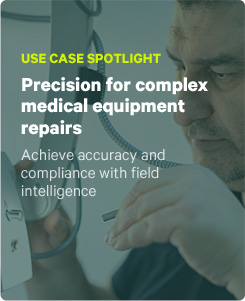At a glance:
- Costly downtime: Unplanned equipment failures significantly impact oil and gas operations, leading to financial losses and disrupted schedules.
- Proactive approach: Predictive maintenance (PdM) leverages data and analytics to prevent downtime, unlike reactive condition-based maintenance (CBM) models.
- Data-driven transformation: Integrating sensor data with decision-making systems is crucial for PdM success, enabling early detection and proactive maintenance actions.
In oil and gas field service, where every minute counts, unexpected equipment downtime isn’t just an inconvenience—it’s a critical setback. According to a study by Deloitte, unplanned maintenance can eat into a significant portion of an organization’s operational budget, up to 20% in some cases. This not only inflates costs but also impacts the overall operational picture, as the downtime resulting from such incidents can also lead to disrupted schedules, delayed service delivery, and unhappy customers.
As the plant manager of a busy petroleum refinery, Emily is responsible for ensuring the facility operates without interruption. She understands the importance of every component, recognizing that a single unit’s stoppage is not just an inconvenience but a significant issue affecting production timelines, costs, and customer relations. To mitigate these risks, she ensures her team promptly addresses all maintenance concerns to prevent minor issues from developing into widescale shutdowns. This approach is critical in managing a complex operation, where maintaining continuous production is essential for meeting business objectives and customer expectations.
Due to recent equipment failures, Emily’s leadership team has recognized the need for a strategic overhaul – something that would take a more proactive stance against costly and risky downtime. They have entrusted her with a vital project: to lead the facility’s transition from condition-based maintenance (CBM) to a predictive maintenance (PdM) model.
“…unexpected equipment downtime isn’t just an inconvenience—it’s a critical setback that can cost up to 20% of an operational budget. That’s why proactive approaches like predictive maintenance (PdM), which utilizes IIoT technology and advanced analytics to preempt equipment failures, are essential.”
Unlike CBM, which relies on the real-time assessment of equipment conditions to determine needs, PdM utilizes IIoT technology and advanced analytics to preempt equipment failures before they occur. This strategic shift requires data accuracy, relevance, and utilization, allowing for more sophisticated, data-driven decision-making. Emily’s role in this initiative goes beyond mere preventive measures; it’s about leveraging insights to redefine operational excellence and set new benchmarks for safety, efficiency, and business sustainability.
Advancing oil and gas predictive asset maintenance
While the refinery already benefits from IIoT-enabled sensors that can track metrics like temperature, pressure, flow rates, and chemical composition, the Crude Distillation Unit (CDU) presents a unique challenge because of its central role in converting crude oil into refined products. Despite its various advanced sensors, the CDU still suffers from frequent issues.
Upon closer inspection, Emily discovers that a vital valve in the CDU routinely fails due to wear and tear, needing repairs lasting anywhere from 12 to 24 hours. This issue points to a bigger problem: the data that can signal impending valve failure remains lost within a maze of control systems, operational databases, and maintenance management software. The lack of integration severely impedes efficient data sharing and analysis, limiting Emily’s ability to be proactive.
Despite its potential to dramatically reduce operational costs and enhance asset life, less than 25 percent of oil and gas operators currently use PdM. Undeterred by the industry’s low uptake, Emily is determined to chart a new course. Her predictive asset maintenance vision leverages advanced analytics and machine learning to transform scattered data into a cohesive system. This innovation goes beyond remediation – it’s about ensuring the refinery can preempt equipment failures and continue uninterrupted operation.
The oil and gas predictive asset maintenance pathway
With a clear understanding of the transformative potential, Emily zeroes in on the CDU for a pilot project to pave the way for refinery-wide implementation. The primary goal is ambitious yet straightforward: to harness data from IIoT and OT sensors and feed it directly into decision-making workflows.
Before she begins, Emily looks at the refinery’s current practices and infrastructure. She organizes workshops with key stakeholders from various departments, including operations, maintenance, and IT, to align everyone with the project’s objectives and gather insights into existing challenges and data gaps. Emily then initiates a comprehensive audit of the existing IIoT infrastructure, which reveals areas where additional sensors are required to provide more precise data for effective prediction models. Emily’s foresight in addressing these foundational aspects is crucial to ensuring the system’s reliability and the accuracy of its predictive capabilities.
Recognizing the complexity of integration, Emily partners with a professional services team specializing in creating seamless data ecosystems while understanding the nuances of oil & gas environments. They develop custom middleware with a connector that gathers, analyzes, and routes data from IIoT sensors to the refinery’s central decision-making platform. The program also has a component that acts as a universal translator to address the challenge of varying data formats and protocols.
After the development phase, Emily begins testing. During this crucial stage, the system detects an anomaly in the valve pressure readings. This early identification allows Emily’s team to plan and execute a maintenance intervention before any unscheduled downtime can occur. Emily uses this detection to assess the response workflows of the refinery in a controlled setting. Her team collaborates with the professional services team to analyze the data, verify the alert, and devise a response plan. This critical moment, where insights lead to proactive maintenance actions, highlights the pilot project’s success and confirms the approach’s effectiveness.
Harnessing predictive insights for operational excellence
With the pilot project in the CDU proving the value of predictive maintenance, Emily and her team start extending this approach to other units within the refinery. Selecting units based on importance, data availability, and maintenance history, this phased rollout focuses on introducing the least interruption. The predictive maintenance system also introduces predictability into technician schedules and resource planning, significantly reducing the frequency of emergency interventions and the associated disruptions.
As the refinery experiences the benefits of this transformative approach, which ranges from increased equipment reliability to optimized maintenance schedules, Emily’s vision of embedding predictive maintenance into the fabric of the refinery’s operations becomes a reality. This shift in strategy positions the refinery for improved efficiency and establishes a benchmark for innovation within the organization and across oil and gas, demonstrating how foresight, collaboration, and technology can collectively drive excellence in service operations.
Charting a new course toward maintenance excellence
Emily’s move to predictive maintenance in her refinery has established a new benchmark using IIoT technology and analytics. This change has increased efficiency, cut downtime, and highlighted the importance of innovation in enhancing operations. Her achievement serves as an example for the oil and gas sector, demonstrating the impact of technology on service improvement.
If you are interested in exploring how integration can transform your predictive asset maintenance practices, contact our sales team today.




